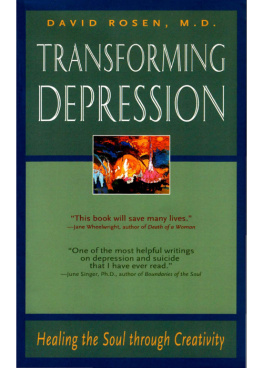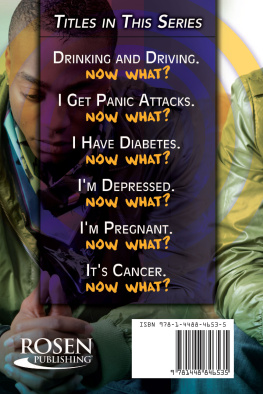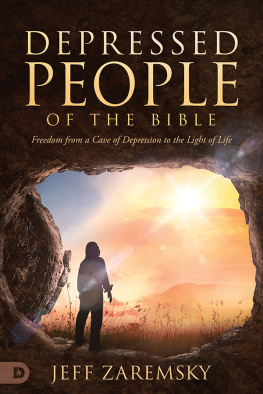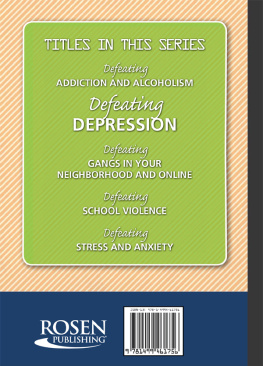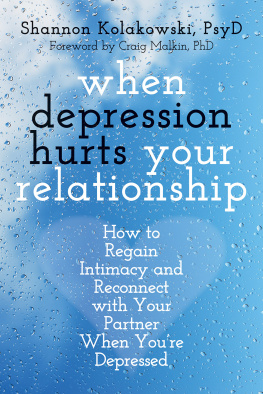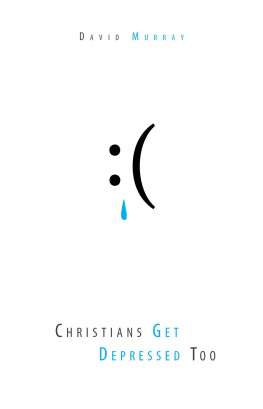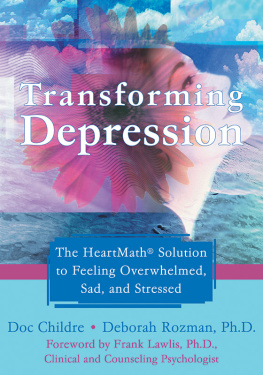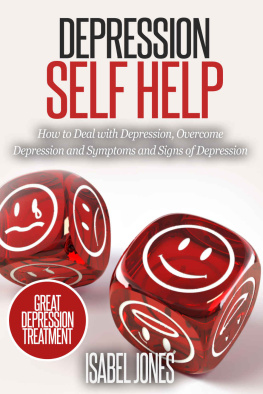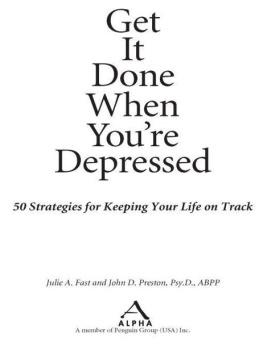Praise for Transforming Depression
What makes Rosen's work so alive is that he lets the material speak for itself.... The urgency of its subject matter transcends doctrinal differences of theory and goes straight for the jugular.
Psychological Perspectives
Spellbinding.... This is an important book, one giving hope that sorrow can be transformed to joy and that the human spirit can soar again.
Litchfield County Times
This sensitive, intelligent approach to depression opens new symbolic and practical meanings. Readers are inspired to see depression as a paradox of illness and transformation that demands a broader understanding than psychiatry has typically allowed. Useful and wise, this book will help those who suffer from depression and their caregivers.
Polly Young-Eisendrath, author of You're Not What I Expected: Learning to Love the Opposite Sex
Rosen's approach to depression is sound, because it honors the natural movement of the soul in becoming depressed in the first place; because it does not cheat the self's demand that at least some part of the ego needs to die; and because it understands that a creative process is the way to accomplish this dying and yet preserve the life of the individual who must undergo this perilous transformation.
John Beebe, author of Integrity in Depth
As clinical psychology seems increasingly dominated by pharmacological treatments, it is refreshing indeed to encounter a therapy that draws on the creative resources of the individual's own unconscious to guide the process of psychic renewal. For those who are depressed or who have a depressed family member, this book could be a lifesaver.
Intuition magazine
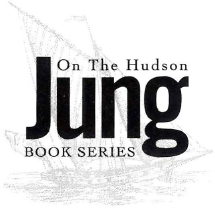
The Jung on the Hudson Book Series was instituted by the New York Center for Jungian Studies in 1997. This ongoing series is designed to present books that will be of interest to individuals of all fields, as well as mental health professionals, who are interested in exploring the relevance of the psychology and ideas of C. G. Jung to their personal lives and professional activities.
For more information about this series and the New York Center for Jungian Studies contact: Aryeh Maidenbaum, Ph.D., New York Center for Jungian Studies, 41 Park Avenue, Suite 1D, New York, NY 10016, telephone (212) 689-8238, fax (212) 889-7634.
For more information about becoming part of this series contact: Nicolas-Hays, P. O. Box 2039, York Beach, ME 03910-2039,

First published in 2002 by
NICOLAS-HAYS, INC.
P. O. Box 2039
York Beach, ME 03910-2039
Distributed to the trade by
Red Wheel/Weiser, LLC
P. O. Box 612
York Beach, ME 03910-0612
www.redwheelweiser.com
Copyright 1993, 2002 David H. Rosen
All rights reserved. No part of this publication may be reproduced or transmitted in any form or by any means, electronic or mechanical, including photocopying, recording, or by any information storage and retrieval system, without permission in writing from Nicolas-Hays, Inc.
Reviewers may quote brief passages.
The following have given permission to use extended quotations from previously copyrighted works: From Henry Miller: The Colosus of Maroussi, copyright 1941 by Henry Miller, reprinted by permission of New Directions Publishing Corporation; From Modern Medicine and the Healing Process, Humane Medicine, Volume 5, Autumn 1989, reprinted by permission of the publisher; Poem #254 by Emily Dickinson from The Complete Poems of Emily Dickinson, Little, Brown, and Company; From The Pharos, Volume 50, Number 3, copyright 1987 by Alpha Omega Alpha Honor Medical Society, reprinted by permission; From Choruses from The Rock, from Collected Poems 19091962 by T. S. Eliot. Copyright 1963 by T. S. Eliot.
Reprinted by permission of Faber & Faber Ltd., London.
Library of Congress Cataloging-in-Publication Data Available on Request
Cover design by Sky Peck Design
Typeset in 10/12 Aldine 721
Printed in Canada
09 08 06 05 04 03 02
7 6 5 4 3 2 1
The paper used in this publication meets the minimum requirements of the American National Standard for Information SciencesPermanence of Paper for Printed Library Materials Z39.481992 (R1997).
www.redwheelweiser.com
www.redwheelweiser.com/newsletter
To my daughters, Sarah, Laura, and Rachel, who have stood by me, encouraged me, and supported my own anima development, creativity, and contact with my soul. My dedication to the feminine is natural since the sui generis Soul, the archetypal feminine, is the only hope for humankind individually and collectively.
Choose Thou the darkness where
Our light must shine
Lighting the path, however dimly
To those who follow after.
SANSKRIT PRAYER
There is but one truly serious
philosophical problem and that
is suicide.
CAMUS
If we take people as they are,
we make them worse. If we treat
them as if they were what they
ought to be, we help them to
become what they are capable of
becoming.
GOETHE
CONTENTS
ILLUSTRATIONS
FIGURES
COLOR PLATES (following page 158)
PLATE Nos.
ACKNOWLEDGMENTS
I acknowledge with heartfelt thanks and gratitude: my parents, Barbara and Max Rosen, who taught me respect for ideas, revealed the creative process, demonstrated courage to communicate new beliefs and concepts, and by example showed me how to survive difficult times; my analysts, both Freudian and Jungian, who have been my healers and teachers: Fred Alston, John Perry, Kay Bradway, Paul Kugler, and James Aylward; my Jungian training analysts, who have been my teachers and healers: Donald Sandner, Daryl Sharp, Marion Woodman, Harry Wilmer, Joseph Wakefield, Julia Morgan, and Mary Eileen Dobson; my patients and students who have taught me more about education (knowledge through experience) and individuation (the healing process toward wholeness) than I could have ever imagined; my Jungian colleagues, for all their honest and helpful feedback (specifically I want to mention James Hall, Jan Bauer, Julia McAfee, and Jane Wheelwright); and my friend, Peter Rutter, who suggested, in the first place, that I submit my manuscript to Jeremy P. Tarcher.
I want to thank Jay Laengrich, a former student of mine, for research work. An important thanks is due Hadley Smith, artist, designer, psychologist, and friend, for her valuable input regarding what illustrations to include in the text. Hadley's help went way beyond my initial request. She reviewed the text and made significant comments and suggestions. Arnold Vedlitz, Luis Cifuentes, Maria-Cristina Garcia, Ann Gardner, Laura Torbet, and Joel Weishaus deserve special mention. Each graciously functioned as reader and critic. Mary Lenn Dixon and Faith Short, too, served as readers and editorial consultants. I am also grateful to Nancy Rosen, my sister, who is also an editor, for feedback regarding specific sections of the book. I want to recognize Jane Blaffer Owen for her sensitive reading of the text and for providing time and space for me to write at historic New Harmony, Indiana. In addition, I want to thank Vicky Newman (for her early editorial help with the cases), Chrissie Battocletti, Louis Lucko, Jo Lynn Ross, Amy Hunnicutt, and Jody Trenckmann for clerical and editorial work; they often went beyond the call of duty. Jody, listed last, actually did the most.

